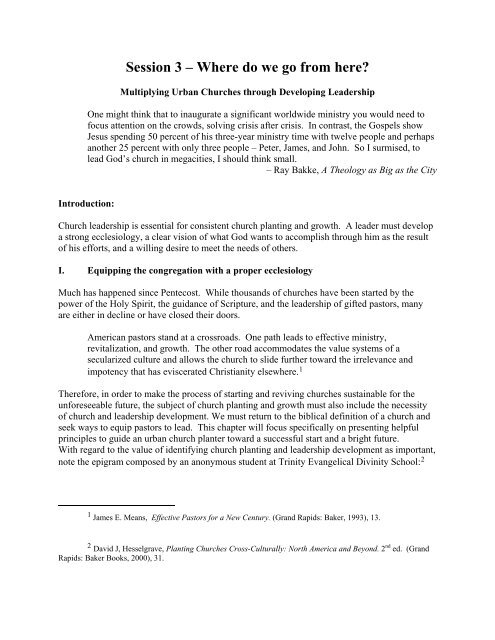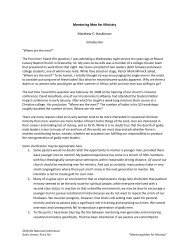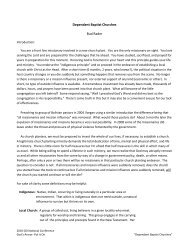Session 1: Why Urban Ministry - Missions Mandate
Session 1: Why Urban Ministry - Missions Mandate
Session 1: Why Urban Ministry - Missions Mandate
Create successful ePaper yourself
Turn your PDF publications into a flip-book with our unique Google optimized e-Paper software.
<strong>Session</strong> 3 – Where do we go from here?<br />
Multiplying <strong>Urban</strong> Churches through Developing Leadership<br />
One might think that to inaugurate a significant worldwide ministry you would need to<br />
focus attention on the crowds, solving crisis after crisis. In contrast, the Gospels show<br />
Jesus spending 50 percent of his three-year ministry time with twelve people and perhaps<br />
another 25 percent with only three people – Peter, James, and John. So I surmised, to<br />
lead God’s church in megacities, I should think small.<br />
– Ray Bakke, A Theology as Big as the City<br />
Introduction:<br />
Church leadership is essential for consistent church planting and growth. A leader must develop<br />
a strong ecclesiology, a clear vision of what God wants to accomplish through him as the result<br />
of his efforts, and a willing desire to meet the needs of others.<br />
I. Equipping the congregation with a proper ecclesiology<br />
Much has happened since Pentecost. While thousands of churches have been started by the<br />
power of the Holy Spirit, the guidance of Scripture, and the leadership of gifted pastors, many<br />
are either in decline or have closed their doors.<br />
American pastors stand at a crossroads. One path leads to effective ministry,<br />
revitalization, and growth. The other road accommodates the value systems of a<br />
secularized culture and allows the church to slide further toward the irrelevance and<br />
impotency that has eviscerated Christianity elsewhere. 1<br />
Therefore, in order to make the process of starting and reviving churches sustainable for the<br />
unforeseeable future, the subject of church planting and growth must also include the necessity<br />
of church and leadership development. We must return to the biblical definition of a church and<br />
seek ways to equip pastors to lead. This chapter will focus specifically on presenting helpful<br />
principles to guide an urban church planter toward a successful start and a bright future.<br />
With regard to the value of identifying church planting and leadership development as important,<br />
note the epigram composed by an anonymous student at Trinity Evangelical Divinity School: 2<br />
1 James E. Means, Effective Pastors for a New Century. (Grand Rapids: Baker, 1993), 13.<br />
2 nd<br />
David J, Hesselgrave, Planting Churches Cross-Culturally: North America and Beyond. 2 ed. (Grand<br />
Rapids: Baker Books, 2000), 31.









